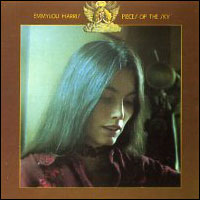
Pieces of the Sky
Pieces of the Sky is the second studio album and major-label debut by American country music artist Emmylou Harris, released on February 7, 1975, through Reprise Records.
Pieces of the Sky
February 7, 1975
Enactron Truck, Los Angeles, California; Track Recorders, Silver Spring, Maryland
38:40 (1975 release)
43:17 (2004 reissue)
Although she had released the obscure folk-styled Gliding Bird five years earlier, Pieces of the Sky became the album that launched Harris's career and is widely considered to be her début. In those intervening years she forged a musical relationship with Gram Parsons that altered the musical direction of her career. The album includes Harris's first high-charting Billboard country hit, the #4 "If I Could Only Win Your Love," and the relatively low-charting #73 "Too Far Gone" (originally a 1967 hit for Tammy Wynette). The overall song selection was varied and showed early on how eclectic Harris's musical tastes were. In addition to her own "Boulder to Birmingham" (written for Gram Parsons, who had died the previous year), she included the Merle Haggard classic "The Bottle Let Me Down," The Beatles' "For No One," and Dolly Parton's "Coat of Many Colors." (Parton, in turn, covered "Boulder to Birmingham" on her 1976 album All I Can Do.) On Shel Silverstein's "Queen Of The Silver Dollar," Harris's longtime friend and vocal collaborator, Linda Ronstadt, sings harmony.
Pieces of the Sky rose as far as the #7 spot on the Billboard country albums chart.
Pieces of the Sky was included in Robert Dimery's 1001 Albums You Must Hear Before You Die.
At the 18th Annual Grammy Awards, the duet single with Herb Pedersen, If I Could Only Win Your Love, was nominated for Best Female Country Vocal Performance but the award went to Linda Ronstadt for I Can't Help It (If I'm Still in Love with You). It would be worthwhile to note that Dolly Parton was likewise nominated the same year for Jolene (as a track from the album In Concert). Emmylou Harris, Linda Ronstadt and Dolly Parton would famously collaborate on the seminal Trio and Trio II albums years later and would earn the trio Grammys for both.